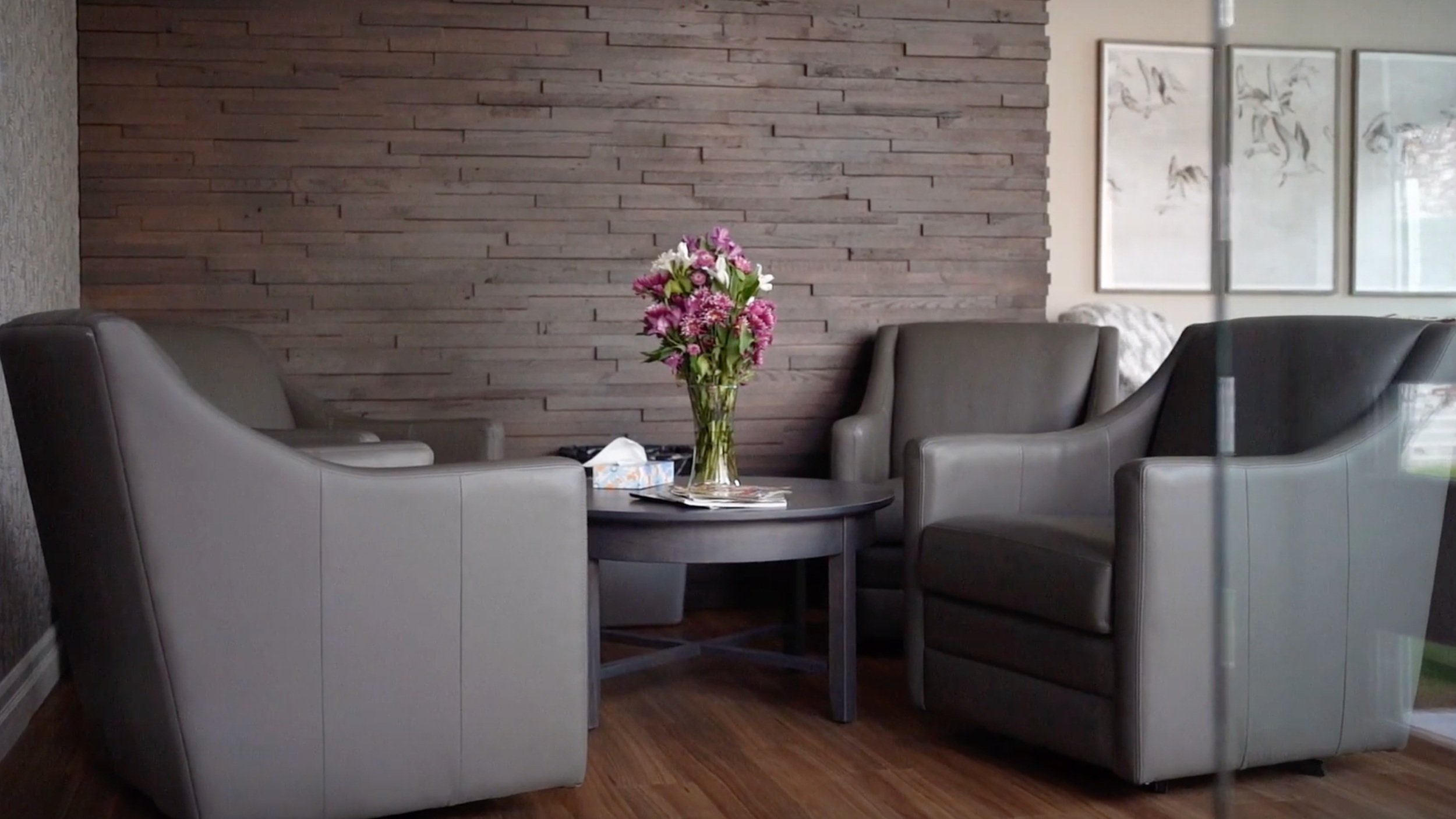The Compassion Movement: An Exploration of Animal & Human Hospice Care | Touring the Rotary Hospice Stratford Perth
“Dying is a fundamental part of living - All beings deserve quality care at the end of life ♡”
What is Hospice & Palliative Care?
Shifting away from a ‘cure or treatment’ mentality, Hospice and Palliative Care is a philosophy of care promoting comfort to people and pets at the end of their lives, including the dying experience. Expanding from the patient as the sole focus of care, the unit of care in hospice includes the caregiver and their needs. An interdisciplinary team working collaboratively is best to provide the comfort care that is needed in hospice. Together, this team not only addresses alleviating physical symptoms for the patient, their care extends to enhancing psychosocial, emotional, and spiritual wellbeing for the entire unit of care. Ultimately helping the patient’s immediate caregivers prepare for the death of their loved one. In veterinary medicine, this interdisciplinary team may be any of the following:
Extended family members
Mental Health Professionals
Veterinarian
Hospice & Palliative Care Providers
Veterinary Specialists
Veterinary Team
Veterinary Technicians
Social Worker
Clergy
Pet Sitter
Groomer
What is the Difference between Hospice Care & Palliative Care?
Hospice Care is provided to pets when they are near the end of their life (ex. when diagnosed with a life-limiting illness) and the goals shift away from curing their condition to focusing on improving their comfort and quality of life.
Palliative Care is provided to pets at any life stage, with both curable and incurable diseases and care is still focused on relief from their symptoms and providing comfort.
When should I consider hospice and/or palliative care for my pet?
Hospice or palliative care can be considered in any of these circumstances:
A pet has a diagnosis of an incurable, irreversible, or terminal condition
A pet has a progressive, undiagnosed disease or chronic disability
There are no further treatments that can help cure the illness your pet is suffering from
A decision not to pursue any curative treatments has been made
Symptoms of a chronic illness interfere with your pet’s routine or quality of life
Home comfort care is preferred over going to a regular veterinary clinic
Animal & Human Hospice Care
With animal hospice care having its roots in human hospice care, there are definitely many similarities in the overreaching practice philosophies of care.
“It takes a special group of dedicated and compassionate professionals passionate about helping others, while comfortable having difficult conversations and being surrounded by grief to do this meaningful work. ”
Black Creek Mobile Vet’s women-led team, Dr. Erica Dickie and Laura Fast, were very fortunate to have a guided tour of the wonderful hospice serving our local community.
P.S. You should check out their video tour on their home page here.Left to right: Laura Fast, Client Care Coordinator with Black Creek Mobile Vet; Louise Lepp, Executive Director of Rotary Hospice Stratford Perth; Dr. Erica Dickie, Certified Hospice and Palliative Care Veterinarian and Founder of Black Creek Mobile Veterinary Services.
Our Connection with Rotary Hospice Stratford Perth
On May 4, 2023 many wonderful businesses gathered in recognition of one another for the Stratford & District Chamber of Commerce 2023 Business Excellence Awards. Black Creek Mobile Veterinary Services was honoured to be nominated in the Entrepreneur category, and The Stratford Perth Rotary Hospice was nominated in the Non-Profit/Charitable category. Our two businesses were selected as the recipients in our respective categories - what an honour!
Comparing Black Creek Mobile Vet and Rotary Hospice specifically, in his Stratford Times article covering the Business Excellence Awards, Stewart Grant said “compassion for others was … a common thread among the award winners.”
“And that’s not all!” I thought. What an opportunity for two unique organizations, dedicated to similar endeavours, to help spread the word about the importance of caring for people and pets through their end of life journey, in a way that is compassionate, comforting, and meaningful.
The Rotary Hospice provides a peaceful, comfortable home with 24-hour specialized palliative care for those at the end-of-life and their loved ones. As an 8-bed residential hospice, it’s a needed alternative to institutional care facilities and home care, allowing families to be family, not caregivers. All at no cost to the individual.
Our Tour of the Rotary Hospice Stratford Perth
Shortly after our awards, Louise Lepp, the Executive Director of Rotary Hospice, reached out offering a tour, which we gladly accepted. Jump ahead two months and on July 6, 2023, we stepped foot into a very welcoming building with beautiful grounds and gardens, large windows and friendly staff.
The flow and layout of the Rotary Hospice is well thought out, with an attention to detail that is needed to ensure the best care possible. The resident’s rooms were very large, all of which face a nature area and are very private. Visitors are allowed 24/7 in hospice - every moment matters. To accommodate this, there is a nice size pullout couch for overnight visiting family members.
Even residents who own pets can have their pets come and stay with them during the day, which we thought is extra special as we know how important it is to maintain these deep bonds and connections through life and death. Allowing companion animals to be present, brings so much comfort to the residents and it is also helpful for pets to be present with their person who is dying. It helps them understand and begin their grief process. Yes, pets do grieve. Additionally, we loved hearing about the St. John Ambulance Therapy Dog visits, and that even a therapy horse came for a visit for an equestrian resident wanting that connection, courtesy of Out of the Ashes Large Animal Rescue.
St. John Ambulance Therapy Dog poster on the Rotary Hospice bulletin board.
Mallory Phillips with Angus from Out of the Ashes Large Animal Rescue doing some community outreach.
The courtyard was a lovely outdoor area with a Reflection pool and fountains. There was also a Reflection room and Family room that were large with a comfortable home-like feeling where families can have some private space to gather during their visits.
The kitchen was like an open view of a cooking show. Everything was in full view from the dining area and it looked just like a kitchen in a home would, with cupboards and countertops, nothing institutional or commercialised here, just home cooked meals. The families who have a loved one in hospice are made daily homemade soup and fresh bread, as making and eating food is rarely a priority. The residents who are still eating can request whatever they want, whenever they want it! If they want ice cream at midnight, you got it! This made me smile, as it reminds me of my home euthanasia appointments where I share that families may feed their pet anything they want for their final meal, including chocolate!
The ‘Spa Room’ - A very special room.
We just loved the ‘Spa Room’ with its large accessible shower and soaker bathtub. Here, residents are pampered by a dedicated care team who help with all their care needs. There is even a volunteer hairdresser. Why is this room so special? Assisting with showering and bathing may not be physically possible for some caregivers without the assistance of another. This can sometimes lead to feelings of guilt. One of the goals in hospice is that the family who has been caring for their dying family member is relieved from their caregiving duties. The caregiving burden for both people and pets nearing the end of their lives is intense in every imaginable aspect, which many people may not quite understand until they are in that situation themselves. Being in hospice removes that burden of care and allows a family to reconnect as a family again.
The Rotary Hospice Stratford Perth opened in 2019 and is free for the individual in need of hospice care. On average, a resident may stay in hospice from 1-21 days. There are approximately 30 staff members and it is always staffed by three core team members: a registered nurse (RN), registered practical nurse (RPN), and personal support worker (PSW). Grief and bereavement support is provided through a social worker (MSW). They also have a network of highly trained volunteers who make a huge difference. There were many donors who made this building possible, and the wall of donors can be seen within.
The hospice has to fundraise approximately $1 million annually, this is half of their total costs to operate. The Ministry of Health funding partially covers costs for RN, RPN and PSW’s only and a large component of its operating budget comes from fundraising efforts such as The Hike for Hospice.
Reflections from Dr. Erica
It takes a highly trained and compassionate team to support those navigating an end of life journey, be it for themselves or a loved one, pet or human. I mentioned earlier that caregiving during this time, while often rewarding, can also be incredibly challenging, which may impact decision-making. This emphasizes the need for this specialized care. Hospice and palliative care providers are uniquely trained in the area of end of life communication. These conversations are difficult and emotionally charged.
They are overwhelming and require a gentle touch, a partnership, open dialogue without judgement, where families feel safe and supported in sharing their fears and hopes. Anticipatory grief is there, it's heavy and deserves attention. It is so important that support systems are in place to help those grieving the expected and eventual loss of a loved one. This also includes pets. It can be so disheartening to see when pet loss grief is treated as something someone should just get over. Pet loss grief is a form of disenfranchised grief because it isn’t commonly acknowledged within the whole of society, and this can prolong the emotional pain of that grief. Bereavement support is needed.
My wish is to see more interdisciplinary veterinary hospice teams to support those pet families in end of life care, with continued focus on attending to pet loss grief. I also wish to see more end of life conversations begin earlier in the disease process for pet families, helping pet families understand the next steps as they arise. Our Quality of Life Consultations are entirely focused on guiding and supporting pet caregivers through their pet’s end of life journey, helping them feel more prepared and empowered in their journey.
Equally important, I wish to see support in place for all animal and human hospice and palliative care team members to help avoid compassion fatigue and burnout, so we can all continue doing this fulfilling and meaningful work.
I’m so grateful we have this amazing facility within our community. Thank you for all that you do Rotary Hospice Stratford Perth ♡
Post-Reflections from Dr. Erica
It is now April 2024. Why the delay in writing this blog? Shortly after our tour, I received word that a very close family friend was dying and in need of hospice care. I reached back out to Louise for resources to help support my best friend and her family navigate this time. It was heartbreaking how quickly everything went. The amount of questions and lack of answers or resources made everything that much more difficult for them.
My best friend Jessica’s mom died on July 16, 2023. She was my next door neighbour, an avid reader, a dog lover, and she played an important role in me becoming a veterinarian.
It has taken me months to write this piece because a part of me felt triggered.
Grief is like that.She will be remembered: Deborah Betty Simpson Fowler ❤ Like what you’ve read? Follow Us


























